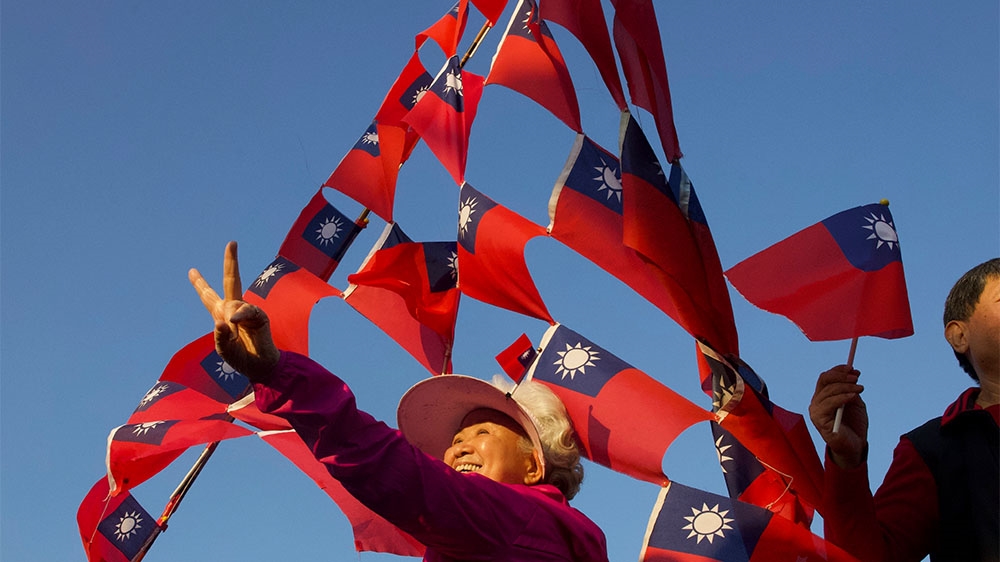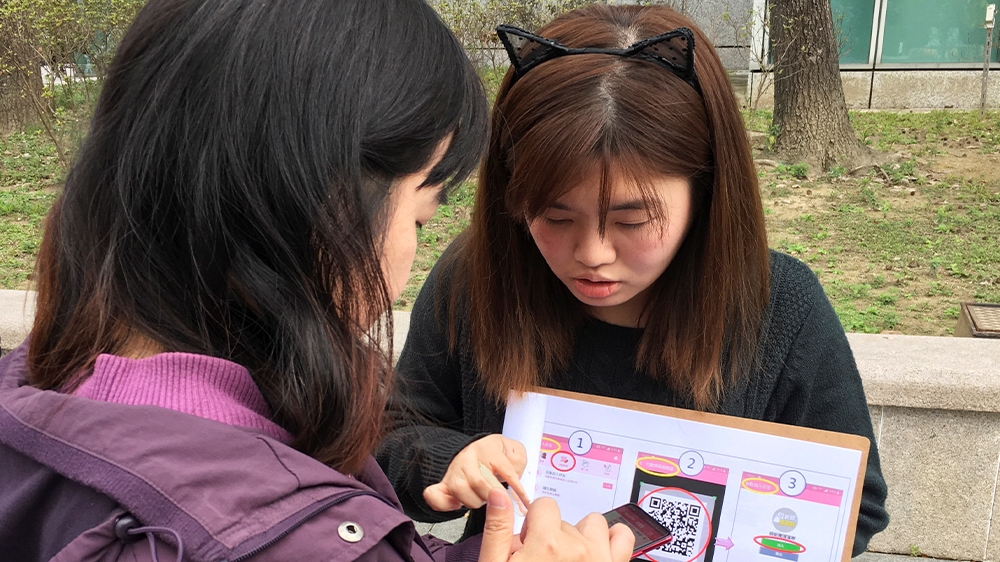The children’s storyteller helping Taiwan sort fact from fiction
Concerns about disinformation, particularly from mainland China, have grown since Tsai Ing-wen first took power in 2016.

Taipei, Taiwan – Children’s storyteller Billion Lee is on the front line in the battle against the online disinformation she worries is undermining Taiwan‘s democracy, one of the most vibrant in Asia.
As a co-founder of Cofacts, a collaborative platform, the 29-year-old helps people verify videos and stories they share on LINE, the Japanese instant messaging application that has some 21 million monthly users – both companies and individuals – on the self-ruled island.
Keep reading
list of 4 itemsGeorgia advances ‘foreign agents’ bill as 20,000 rally against it
NPR editor resigns after accusing US outlet of liberal bias
Lawmakers brawl as Georgian Parliament considers ‘foreign agent’ bill
“Taiwanese are unclear of the difference between fact and opinion, that’s not in our education,” Lee said.
Set up in 2016, Cofacts is designed as a chatbot and receives approximately 250 questionable messages for verification each week.
Each story or video is checked against the platform’s ever-growing database of similar articles or videos that have already been fact-checked, as well as online tools before the outcome is messaged back to the sender.
Most of the fact-check editors are volunteers who collaborate on each query.
Concerns about disinformation, particularly from mainland China, have grown since President Tsai Ing-wen first took power in 2016 and China, which sees Taiwan as part of its territory, stepped up pressure on her government. She was returned this month for a second term in a landslide.
Ming-Yeh Rawnsley, a research associate at SOAS’s Centre of Taiwan Studies in London and founding editor-in-chief of the International Journal of Taiwan Studies, said that it was relatively easy to spread fake news in Taiwan because of the popularity of social media platforms and messaging apps like LINE with their group chat features.

“The news items they [people] circulated via their own social media networks were more on election-related items,” Rawnsley told Al Jazeera. “Social media becomes fertile ground for misinformation and partial information.”
‘Main’ target
Analysts have said China is targeting the island’s media.
“China is actively spreading false and misleading information abroad, with Taiwan as one of its main targets,” the V-Dem Institute at the University of Gothenburg wrote in its V-Dem Annual Democracy Report 2019, which was published in May last year.
“By circulating misleading information on social media and investing in Taiwanese media outlets, China seeks to interfere in Taiwan’s domestic politics and to engineer a complete unification,” the report added.
In June, thousands took to the streets of the capital to protest against the presence of so-called “red media” outlets in Taiwan, publications said to be influenced by China. Last month parliament passed an anti-infiltration law – legislation to counter the mainland’s influence on the island’s politics through the illegal funding of media and politicians.
Cofacts’s Lee said she suspected some of the fake news stories they discovered originated from the mainland because the posts used different words and simplified Mandarin, in contrast to Taiwan’s traditional script.
But it is not only China.
In the run-up to this month’s election, some disinformation was found to have originated from Taiwanese politicians and their political supporters.
Roy Ngerng, a researcher at the National Taiwan University (NTU)’s Risk Society and Policy Research Centre, who studies the issue, said identity politics is key to the spread of such disinformation given the clearly defined split between those who identify more as Taiwanese and those who identify more with China.
“Depending on their political alignment, they would then fall prey to the type of disinformation based on their political beliefs, though it [is] clear the disinformation being spread by the pro-KMT camp is more pervasive,” he told Al Jazeera. The KMT or Kuomintang is Taiwan’s pro-China party.

On an island that was governed by martial law between 1949 and 1987, Ngerng added that some were also still adjusting to the democratic environment.
“Some among the older generation who grew up under an authoritarian regime are more polarised and less critical of the news they absorb, and are more entrenched in taking political sides,” Ngerng said.
“They tend to be faithful to specific TV channels based on their political affiliation,” he added.
As of 2018, Taiwan had five terrestrial television stations, 65 cable television operators and 252 newspaper publishers, regulated through the Radio and Television Act, which is supposed to ensure media independence and professionalism.
|
|
According to the Reporters Without Borders, Taiwan is second only to South Korea in the Asia-Pacific in terms of media freedom and ranks 42nd out of 180 countries and territories in the 2019 World Press Freedom Index.
‘Susceptible to disinformation’
Concerns about fake news have increased around the region – and around the world – as a political debate has moved online and onto social media and messaging apps.
In Singapore, the Protection from Online Falsehoods and Manipulation Act (POFMA) came into effect in October, giving the government the power to order corrections be placed next to posts it deems to be false.
Critics questioned whether the government, which has been in power since the 1960s and has all but six of the 89 elected seats in parliament, should really be making that decision.
It has already made a number of orders, including against opposition politicians, and is now facing a court case brought by the Singapore Democratic Party after a minister ordered the opposition party to place a “correction” next to one of its posts.

In Thailand, the government set up an “anti-fake news” centre last November, while Vietnam has a cybersecurity law that has been used against people making critical comments on social media.
But other countries are reluctant to adopt such legislation for fear of undermining the democracy they say they are trying to protect.
Malaysia last year repealed the Fake News Law brought in by the previous government just weeks before the 2018 election, and Taiwan, while it has passed the anti-infiltration law, may not want to bring in more regulation.
“This contravenes the very principle of free speech and human rights in a democracy,” NTU’s Ngerng said.
“Greater education and media literacy are better tools to address disinformation if the aim is to promote democratic thinking and development,” he said.
Lee hopes Cofacts will go some way towards helping the people of Taiwan be more discerning about the information they receive and verify its authenticity before sharing.
But she also knows that fact-checking is only likely to become more challenging as technologies come online that make it easier to create and disseminate questionable content.
“You know these new media outlets, new [YouTube] channels, new information are all changing, then we have to pay more attention to this [change],” Lee said.
“We hope we can help.”